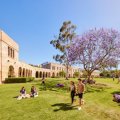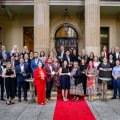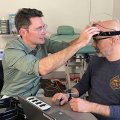The University of Queensland will honour a freelance journalist who launched a citizen journalism service in Indonesia.
Harry Surjadi has won the Communication for Social Change Award individual category for his work training citizen journalists in Indonesia.
The UQ awards’ theme, Exposing injustice: ICTS and Social Change celebrates individuals and organisations using communication to transform and empower marginalised communities.
Through his work with a local television station, Surjadi has trained nearly 200 indigenous community members to report via mobile phones on illegal logging and land acquisitions by palm oil companies.
Community members can send their news directly to the television station and contribute to wider exposure on illegal practices in Indonesia.
Mr Surjadi said winning the award gave him an incredible opportunity to share his community's work with the world.
"I hope this communication model will prove useful to the sustainable development of indigenous people," he said.
The Cambodian Centre for Human Rights won the Communication for Social Change organisational category for developing an online human rights information portal.
The Sithi Project portal provides information on media, human rights laws and civil society organisations in Cambodia.
It engages with local community groups online, highlights land rights violations and encourages communities to advocate for their rights within a politically volatile context.
Cambodian Centre for Human Rights president Ou Virak said the team was thrilled to have been picked to receive this award.
“We thank you for giving us such an important recognition,” he said.
The awards will be presented at a ceremony on 22 May from 5.30pm to 7.30pm.
Centre for Communication and Social Change co-director Associate Professor Pradip Thomas said the award jury received nominations from some of the world’s most creative and innovative communication projects.
“We received 65 nominations from 27 countries, including Papua New Guinea, Indonesia, Senegal, Vanuatu, New Delhi, Mozambique and Brazil,” he said.
“In an age where ordinary citizens increasingly engage in new forms of information sharing, UQ has chosen to recognise those who use these digital tools to empower marginalised communities.”
Media: Rhian Deutrom, 3346 3465 or r.deutrom@uq.edu.au
.jpg)









